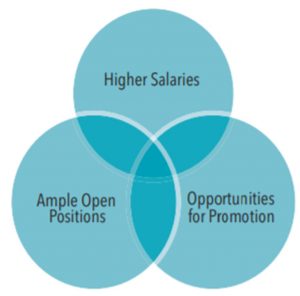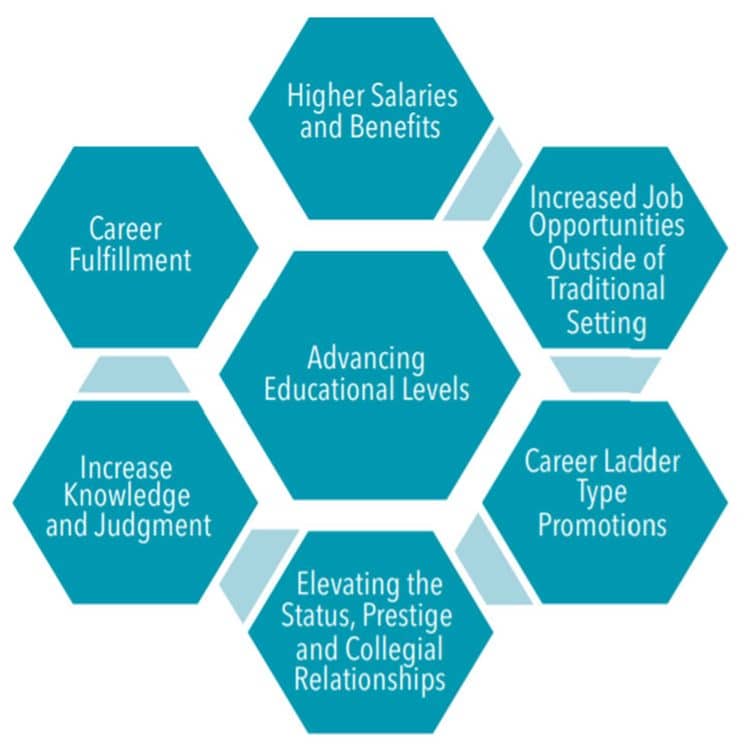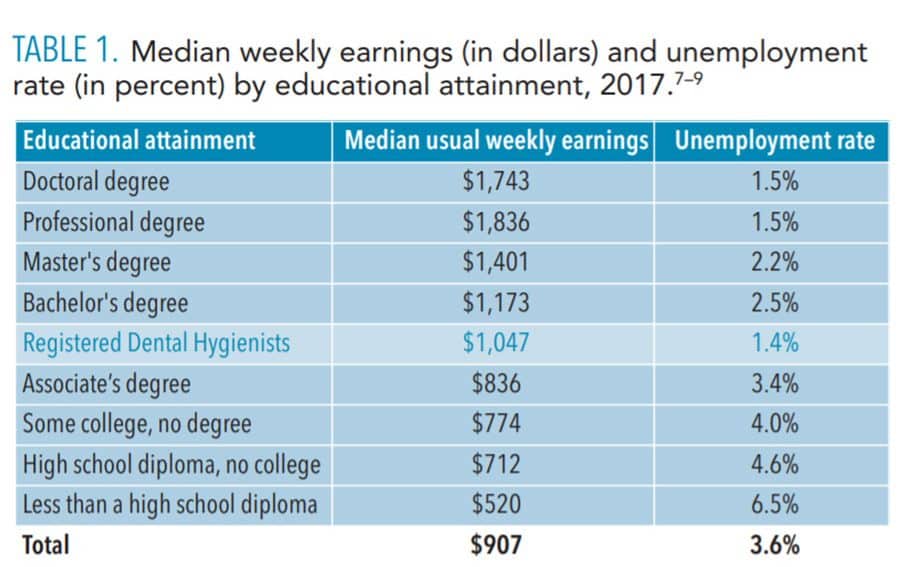Impact of Education on Your Career
The door to more employment choices, additional promotion opportunities, and higher salaries opens with the attainment of higher degrees.
Although dental hygiene is a young profession comparatively speaking, the number of dental hygienists has grown significantly in recent years in correlation with the increase in the number of dental hygiene schools. The United States Bureau of Labor Statistics projects an 11% growth rate for dental hygiene positions from 2018 to 2028, which is much higher than the 5% average for all professions.1 In fact, dental hygiene has been highlighted in recent years as the second best in health career support jobs, and 30th in overall best jobs.2
Dental hygiene education has evolved since the early 1900s, with education starting out as a 1-year program.3 The current standard is a minimum of 2 academic years; however, the majority of dental hygienists actually complete 4 years of education or more by graduation.4 Factually speaking, dental hygiene education content has increased significantly over the years, even if accreditation standards do not reflect this reality. Additionally, the number of advanced educational programs—both Bachelor of Science in Dental Hygiene degree completion and Master of Science in Dental Hygiene programs—continues to grow.
Although the first dental hygienist, Irene Newman, RDH, began training and was employed in the private dental office of Alfred Fones, DDS, the first class of dental hygienists initially found employment in school settings. In fact, Fones proposed that dental hygienists work in hospitals, sanitariums, industrial factories, and municipal clinics as outreach workers to directly provide preventive therapies and education to patients, and subsequently refer patients for comprehensive dental treatment as needed to private dental offices.5 And although the majority of dental hygienists practice within private dental offices, that trend seems to be slowly changing. In order to continue this movement of bringing dental hygiene directly to patients while expanding career opportunities, dental hygienists must realize the reasons to advance their educational preparation.

DESIRABLE CAREER CHOICE DEFINED
According to US News & World Report, which is well known for ranking the top jobs in the US, workers tend to prefer careers with higher salaries, ample open positions, and opportunities for promotion (Figure 1).6 These attributes make logical sense, as most people need salaries for living expenses and individuals tend to pursue jobs that have greater employment opportunities. Moreover, most workers enjoy the ability to become competent in a position and then strive for additional goals, responsibilities, and opportunities within their chosen field.
College degree status alone does not ensure employment. However, few would argue that education does, in fact, lead to more opportunities for employment, career promotions, and higher salaries in general. The US Bureau of Labor Statistics reports that data consistently show that, in terms of dollars, education makes sense (Table 1).7–9
COMPENSATION
Interestingly, higher salaries exist for all dental hygienists regardless of educational degree attainment, at least compared to national salary norms. The other two indicators for best jobs fit well into the opportunities existing for dental hygienists with advanced degrees. And all three of these attributes improve with advanced educational preparation.
Although many anecdotally report that degree levels do not directly correlate with higher salaries, dental hygienists with higher degrees reported earning a higher income.10 Dental hygienists with more than one state license also were more likely to have a bachelor’s or higher degree, and earned a higher income than dental hygienists with a single license.10 One study conducted on degree completion graduates also revealed a correlation between higher salaries and employment benefits with additional degree attainment.11 This supports the fact that, higher college degree levels coincide with higher salaries.7 Increasing degree levels in a dental hygiene career is no exception.
JOB AVAILABILITY
Advancing degree status in dental hygiene can also provide an advantage when obtaining employment.12 One study revealed that graduates with bachelor’s degrees were more likely to attain positions in nontraditional settings.13 This leads to more opportunities for dental hygienists with advanced degrees outside of a private dental office.
Study results showed that graduates of Master of Science in Dental Hygiene Programs were satisfied with their degree choice as well as the opportunities it had afforded them.14 Moreover, another study revealed that the majority of dental hygienists queried placed a high value on graduate education as it related to expanding employment options and satisfying personal goals.15 There seems to be no disagreement on the ability for advancing degrees to open opportunities for dental hygienists.
The nursing model illustrates the concept that with increased educational preparation and degree attainment, there is a defined set of increased career opportunities. This model is paralleled to dental hygiene in a position paper on the future of dental hygiene proposing advanced degrees in dental hygiene. This advancement would allow for differentiation that would promote career laddering based on educational level as seen in other health professions such as nursing and physical and occupational therapy.16 The American Dental Hygienists’ Association (ADHA) has been advocating for the entry-level bachelor’s degree since 1986. Additionally, two papers published by the ADHA mirror this theory of career laddering with advanced educational degree attainment.17,18 The majority of dental hygiene program directors felt that advancing entry level education to the bachelor’s degree was either very important or imperative.12
OPPORTUNITIES FOR ADVANCEMENT
Not surprisingly, baccalaureate-prepared dental hygienists were more likely to seek advanced degrees.11 One study found that the Bachelor of Science in Dental Hygiene as entry-to-practice may be essential in elevating the status of the dental hygiene profession to that of other midlevel healthcare providers.19 Improving professional competence and credibility with colleagues and patients may be an important personal benefit of earning a baccalaureate degree.19 This is one way to increase opportunities for growth and promotion in dental hygiene. Additionally, dental hygienists with more education tend to volunteer more, which fosters professional socialization, expands networking, and creates career opportunities.10
One study revealed that dental hygienists indicated their patient care had improved with baccalaureate education due to increased knowledge, understanding, and abilities to make judgements with a particular emphasis on evidence-based decision making.20 These advanced abilities provided them with increased confidence for adopting a collaborative role, particularly in interprofessional contexts and improved the quality of their decision-making, thus leading to better patient care.20 Dental hygienists with more education are positioned to work outside of typical dental practices, integrating dental care into a variety of healthcare systems.
Minimally, an entry-level baccalaureate degree will promote the successful contributions of dental hygienists working in interprofessional collaborative environments with other healthcare professionals with similar degrees. More important, appropriately educated oral healthcare professionals will be positioned to better meet the complex health needs of the public with quality comprehensive care.21 Educational degrees advance career promotion (Figure 2).

CONCLUSION
Although dental hygiene began as a 1-year collegiate program, it quickly evolved to 2 years of academic training. Now, it is most common for dental hygienists to have 4 or more years of college. Although dental hygienists have higher salaries than most professions, advancing education can add to even higher salaries with employment benefits, job opportunities outside of clinical practice, and the ability for career ladder-type of promotion. Basically, dental hygienists do have more employment choices, promotion opportunities, and higher salaries with the attainment of higher degrees. These are significant and applicable reasons for dental hygienists to advance their education.
REFERENCES
- United States Bureau of Labor Statistics. Occupational Outlook Handbook, Dental Hygienists. Available 3. bls.gov/ooh/healthcare/dental-hygienists.htm. Accessed July 20, 2020.
- US News & World Report. Dental Hygienist Reviews and Advice. Available at: https://money.usnews.com/careers/best-jobs/dental-hygienist/reviews. Accessed July 20, 2020.
- Motley WE. History of the American Dental Hygienists’ Association 1923-1982. Chicago: American Dental Hygienists’ Association, 1983.
- American Dental Association. Allied Dental Survey: Dental Hygiene 2017-2018. Available at: ada.org/en/science-research/health-policy-institute/data-center/dental-education. Accessed July 20, 2020.
- Fones AC. Mouth Hygiene. 2nd ed. Philadelphia: Lea & Febiger; 1921.
- US News & World Report. How US News Ranks the Best Jobs. Available at: https://money.usnews.com/money/careers/articles/how-us-news-ranks-the-best-jobs. Accessed January 20, 2020.
- Torpe E. Measuring the value of education: data on display. Available at: https://www.bls.gov/careeroutlook/2018/data-on-display/education-pays.htm. Accessed January 20, 2020.
- US Bureau of Labor Statistics. Household Data Annual Averages: Median Weekly Earnings of Full-Time Wage and Salary Workers by Detailed Occupation and Sex. Availale at: bls.gov/cps/cpsaat39.pdf. Accessed July 20, 2020.
- US Bureau of Labor Statistics. Household Data Annual Averages: Unemployed Persons by Occupation and Sex. Available at: bls.gov/cps/cpsaat25.pdf. Accessed July 20, 2020.
- American Dental Hygienists’ Association (ADHA). Survey of Dental Hygienists in the US. ADHA: Chicago; 2007.
- Kanji Z, Laronde DM. Career outcomes of dental hygiene baccalaureate education: a study of graduates’ professional opportunities, further education, and job satisfaction. J Dent Educ. 2018;82:809–818.
- American Dental Hygienists’ Association (ADHA). Dental Hygiene Education Program Director Survey. ADHA: Chicago; 2008.
- Rowe DJ, Massoumi N, Hyde S, Weintraub JA. Educational and career pathways of dental hygienists: comparing graduates of associate and baccalaureate degree programs. J Dent Educ. 2008;72:397–407.
- Jevack JE, Wilder RS, Mann G, Hunt RJ. Career satisfaction and job characteristics of dental hygiene master’s degree graduates. J Dent Hyg. 2000;74:219–229.
- Smith AN, Boyd LD, Rogers CM, Le Jeune RC. Self-perceptions of value, barriers, and motivations for graduate education among dental hygienists. J Dent Educ. 2016;80:1033–1040.
- Fried JL, Maxey HL, Battani K, Gurenlian JR, Byrd TO, Brunick A. Preparing the future dental hygiene workforce: knowledge, skills, and reform. J Dent Educ. 2017;81:S45–eS52.
- American Dental Hygienists’ Association (ADHA). Dental Hygiene: Focus on Advancing the Professsion. Chicago: ADHA; 2005.
- American Dental Hygienists’ Association (ADHA). Transforming Dental Hygiene Education and the Profession for the 21st Century. Chicago: ADHA; 2015.
- Rogers C, Johnson TB, Gurenlian JR. New York state dental hygienists’ perceptions of a baccalaureate degree as the entry-level degree required for practice. J Dent Hyg. 2015;89(Suppl 2):13–21.
- Sunell S, McFarlane R, Biggar HC. Differences between diploma and baccalaureate dental hygiene education in British Columbia: a qualitative perspective. Int J Dent Hyg. 2017;15:236–248.
- Stolberg RL, Tilliss T. The caccalaurette-educated dental hygienist. J Evid Based Dent Pract. 2016;16(Suppl):136–143.
From Dimensions of Dental Hygiene. July/August 2020;18(7):12-14.


